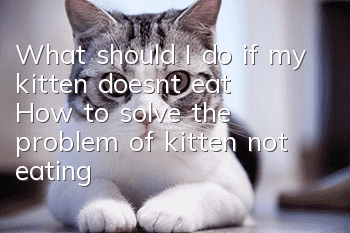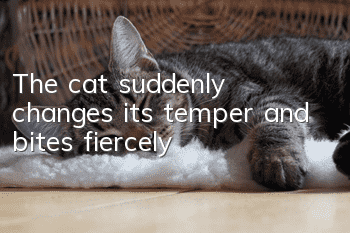What should I do if my kitten doesn’t eat? How to solve the problem of kitten not eating

As pet owners, we are responsible for their lives. In the process of raising pets, we need to give them enough attention and love, and provide them with a healthy diet and living environment. However, sometimes despite our best efforts, pets still develop health problems. This article will discuss the reasons why kittens won’t eat and how to deal with them, to help pet owners take better care of their kittens.
1: Understand the eating habits of kittens
It is important to understand the eating habits of kittens because their dietary preferences and digestive systems are different from those of adult cats. Kittens need more protein and fat to support their growth and development. In addition, kittens are often more prone to digestive problems than adult cats, so they need special attention.
2: Reasons why kittens don’t eat
Kittens may not eat for a variety of reasons, including illness, digestive issues, emotional stress, etc. Pet owners need to carefully observe the kitten's behavior and health to find out the root cause of not eating.
Three: Check the kitten’s health
If the kitten is not eating, you first need to check its health. Pet owners can observe whether the kitten has other abnormal behaviors, such as vomiting, diarrhea, fever, etc. If you suspect your kitten is sick, you should take it to the veterinarian immediately.
Four: Pay attention to the kitten’s eating environment
Sometimes a kitten won’t eat because the eating environment is uncomfortable. Pet owners need to ensure that the areas where their kittens eat and drink are clean and free of odors or foreign matter. In addition, if multiple pets live in the same environment, competition for food may occur, which needs to be resolved in time.
Five: Provide high-quality food
A kitten's diet should include high-quality dry and wet cat food. Pet owners need to choose food that meets their kittens’ needs and ensure their daily nutritional intake. Also, don’t change your kitten’s food brand or flavor at will to avoid stressing their digestive system.
Six: Add appropriate snacks
If the kitten does not eat for a long time, you can add some cat snacks, such as chicken, fresh shrimp, etc. However, pet owners need to be careful about the portion size and frequency of treats to avoid negatively affecting their kitten’s health.
Seven: Keep pet owners emotionally stable
Kittens are very sensitive and will detect the emotions of their pet owners. If a pet owner is depressed or anxious, they mayWill affect the kitten's eating situation. Therefore, pet owners need to keep their emotions stable and give their kittens enough attention and love.
Eight: Increase the amount of exercise
If the kitten does not eat for a long time, it may be due to lack of sufficient exercise. Pet owners can increase the amount of exercise for kittens, such as playing, walking, etc., to help them increase their appetite and digestive function.
9: Give enough water
Kittens need sufficient water to aid digestion and metabolism. Pet owners need to make sure their kittens drink enough water, prepare a clean water basin and change the water source regularly.
Ten: Appropriate use of drugs
If the kitten has not been eating for a long time because of illness or digestive problems, the pet owner may need to use some medications to help the kitten relieve symptoms. However, you need to follow your veterinarian's recommendations when using medications and pay attention to the dosage and duration of use.
1: Adjust the kitten’s eating time
Kittens should eat regularly and not too frequently or irregularly. Pet owners can adjust the eating time according to the kitten's condition to make it more consistent with the kitten's needs and habits.
2: Observe the kitten’s emotional changes
Kittens not eating may be caused by emotional problems. Pet owners need to carefully observe the kitten’s emotional changes, such as anxiety, nervousness, etc. If needed, consider providing the kitten with appropriate comfort and a warm environment.
3: Pay attention to the growth and development of kittens
Kittens need adequate nutritional support for their growth and development. Pet owners need to regularly measure their kittens' body weight and height to ensure they are growing and developing normally.
4: Develop good eating habits
Pet owners need to fundamentally solve the problem of kittens not eating. Developing good eating habits is very important to help kittens develop healthy eating habits and avoid the problem of skipping meals from recurring.
5: Summary
Kittens not eating are common health problems. Pet owners need to understand the kitten’s habits and living environment to find out the cause and take appropriate measures. Whether in terms of healthy diet, emotional regulation or exercise, kittens need to be given enough attention and love to help them grow healthily.
- Do many people buy Ragdoll cats?
- Why don’t Ragdoll cats meow? Poop scrapers need to pay attention!
- Why does a female cat urinate randomly?
- How to clear the toilet when cat litter blocks it?
- Can two female cats be kept together?
- How to judge the appearance of a tabby cat? How to choose a tabby cat with good appearance?
- Do "3 dos and 1 don't" to keep your cat away from obesity
- What are the benefits of cats eating chicken liver? The dangers of cats eating too much chicken liver
- Is catnip the same as regular mint?
- What is the enclosure behavior of cats? How to correct the enclosure behavior of cats!



